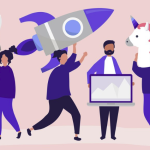Introduction
In recent years, the integration of Artificial Intelligence (AI) and automation has revolutionized business operations across industries. From predictive analytics and personalized customer experiences to intelligent supply chains and autonomous systems, AI is not just a trend — it is a global business transformation tool. As we enter 2025, companies that embrace AI are gaining a significant edge in efficiency, scalability, and profitability.
Why AI is the New Backbone of Business Strategy
Artificial Intelligence offers businesses the ability to analyze massive datasets, identify patterns, and make informed decisions faster than any human team could. It reduces human error, cuts operational costs, and improves the accuracy of forecasts and projections. From startups to Fortune 500 companies, integrating AI into core business processes is no longer optional — it’s essential for survival and growth.
Key Benefits of AI in Business:
- Increased productivity through automation of repetitive tasks
- Cost savings in customer service, logistics, and back-office operations
- Improved decision-making using predictive analytics
- Enhanced customer experience through personalization
- Scalability for global operations
Industries Transformed by AI
1. Finance and Banking
AI-driven algorithms are used for fraud detection, risk assessment, robo-advisors, and algorithmic trading. Financial institutions are leveraging machine learning to personalize financial products and reduce human bias in lending.
2. Healthcare
AI-powered diagnostics tools can now detect diseases like cancer or Alzheimer’s earlier and more accurately than traditional methods. It also supports drug development and patient data management.
3. Retail and E-commerce
Retailers use AI for inventory management, customer behavior tracking, and dynamic pricing. Chatbots and recommendation engines are enhancing customer satisfaction and boosting conversions.
4. Manufacturing
Automation via robotics and AI is making manufacturing smarter. Predictive maintenance, supply chain optimization, and real-time quality control are revolutionizing production lines.
5. Logistics and Transportation
Self-driving technology, route optimization, and demand forecasting are reshaping how goods and people move globally.
AI and the Future of Work
While there are concerns about job displacement due to automation, AI is also creating new job categories and enhancing the roles of existing ones. Jobs in AI development, data science, ethics, and AI oversight are in high demand. Businesses are investing in upskilling their workforce to thrive in an AI-powered environment.
Global Market Impact: Numbers that Matter
- The global AI market is projected to exceed $1.8 trillion by 2030, according to Grand View Research.
- AI is expected to contribute $15.7 trillion to the global economy by 2030 (PwC).
- Over 70% of businesses are already using some form of AI in their operations (McKinsey).
These numbers highlight how vital AI adoption is to stay competitive in a digitally transforming market.
Challenges and Ethical Considerations
Despite its benefits, AI also brings challenges and ethical dilemmas:
- Data privacy and security concerns
- Bias in algorithms
- Regulatory uncertainty
- Over-reliance on automation
To mitigate risks, companies must implement AI governance frameworks, ensure transparency in algorithms, and focus on ethical AI practices.
Best Practices for Implementing AI in Business
- Define clear objectives for AI adoption — tie it to business outcomes.
- Invest in quality data — AI is only as good as the data it learns from.
- Start small, scale fast — pilot projects help validate ROI.
- Collaborate with experts — partner with AI consultants or tech firms.
- Train your workforce — foster a culture of innovation and learning.
Conclusion: Embracing the AI-Powered Future
AI is no longer a futuristic concept; it is a present-day business imperative. Companies that strategically adopt AI and automation will dominate their industries, while those who resist will risk falling behind. The key to success in 2025 and beyond lies in responsible, agile, and ethical integration of AI into business ecosystems.



